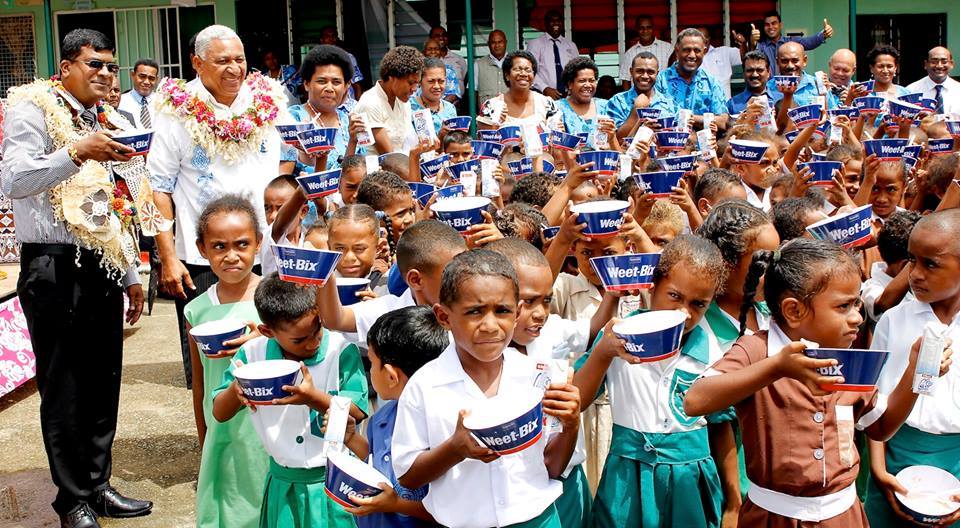

When it comes to taxation, the public well know the expression ‘one hand giveth and the other taketh’.
But in Fiji, we have one Ministry that builds while others destroy.
The Fiji government’s Ministry of Health professionals are valiantly and correctly exhorting us through the media to consume more of our local nutritious food and drinks.
The worthwhile objective is to slow down or reverse Fiji’s epidemic of non-communicable diseases caused by our increasing consumption of more processed and less nutritious foods, some classified as ‘junk foods’.
But the reports from the Fiji Bureau of Statistics household income and expenditure surveys all show evidence that our consumption of processed and imported foods is accelerating.
We are consuming more imported flour and rice and less dalo and yams.
We are consuming more imported meats like fatty lamb or chicken which is fed largely imported chicken feed, than our traditional proteins like fresh fish or shellfish.
We are consuming less of our traditional vegetables like rourou and tubua (churaiya).
We are consuming more of the junk foods including sweetened soft drinks, and less of our traditional snacks and drinks.
Read here for the latest data:
https://narseyonfiji.wordpress.com/2012/03/31/report-on-the-2008-09-household-income-and-expenditure-survey-fibos-2011/
or read this on marine food consumption:
https://narseyonfiji.files.wordpress.com/2012/04/the-regression-of-marine-foods-consumption-in-fiji-changes-2002-03-to-2008-09-south-pacific-studies-322-pp105-127.pdf
But the irony is that while one arm of government is trying to improve nutrition, other arms are helping to destroy it or standing idly by while it is destroyed.
I give just four ongoing examples, involving the Ministry of Education and the private sector, but there are more.
Ministry of Education and Sports
In most developed countries, the ministries of education and government will not allow the manufacturers of junk food to sponsor school events.
But it is perfectly OK in Fiji.
For a few years now, the national athletic championships for schools has been called after a soft drink, Coca Cola, largely because the private soft drink company provides some funding which government is not willing to provide.
The inevitable result is that the company brand name is thrust into children’s minds day in day out, and through out the year, associated with a healthy sporting exercise.
The company brand name is mentioned dozens of times over television news, while the company representative enthuses about the passion that schools, teachers and students, are showing the Games.
Instead, what the Ministry of Education does indirectly, is encourage the consumption of an incredibly sweetened drink, whose excessive consumption is associated with diabetes in our children.
Often, meal packages from popular food outlets, include that product together with a hamburger or fish, with chips.
Is it any wonder that with such official ministerial support, the consumption of that product keeps increasing, as does the incidence of diabetes.
Milk and weet bix
As part of their election strategy, the Fiji First Party promised free milk for Class One students throughout Fiji.
Currently, the Bainimarama Government is delivering on the promise and the milk, no doubt to the great delight of Rewa Dairy Company and its owner, CJ Patel.
Whether this is the best way to use tax payers’ funds to improve children’s nutrition and education, I leave to the government nutritionists to answer (if they ever bother).
But astonishingly, the Bainimarama Government also announced that with the milk, they were also handing out Weet bix and special branded bowls and spoons to go with it.
The Minister of Education (Dr Mahendra Reddy) and the Prime Minister (Bainimarama) duly made the presentations at some village school, accompanied of course by the ubiquitous salusalu, and grateful thanks from the villagers.
Handouts, of any kind are always welcome, anywhere in Fiji.
But, was the Ministry of Health consulted on this Weet bix initiative?
Of course, the supplying company Sanitarium, and their agents in Fiji, would have been delighted to give it “for free”, but no doubt hoping that the consumption of that product will go up in future, as it is likely to do, especially with the Ministers’ blessings.
But most Fiji families have good local breakfast foods, which the Wheetbix is substituting.
If our children get used to Weet bix, of course, they will not want to eat dalo or kumala or yams or some roti and curry, for breakfast.
The Weet bix is a more expensive and imported product, whatever its nutritional value.
If the trend continues, Fiji will be importing more of such products, worsening our food security, and probably worsening the children’s nutrition,
All with the blessing and assistance of the Minister of Education and the Prime Minister, of course.
Chicken stickers and school products
The public has been watching on television ads, school children and teachers being encouraged to buy a particular brand of chicken in order to collect stickers that can be redeemed by the schools for educational products.
Just lately, the same company is using the scheme to send teachers and children on exchange visits to New Zealand.
Of course these educational rewards are good for the children and teachers.
But why are school children, teachers and schools being used to foster the consumption of a particular brand of protein, whose inputs are largely imported?
Similarly, student and teacher exchange would normally be a good exercise, to be funded by the Ministry of Education and tax-payers who could ensure appropriate representation, not managed by a private company to boost its chicken sales by selecting and rewarding those who buy more of its chicken.
Note that while some may claim that it is merely one chicken brand competing against another chicken brand, I can assure you that not only will our consumers end up consuming more chicken, of all brands, but they will be consuming less of all our traditional proteins such as fresh fish and shell fish.
Exactly similar processes are at work when noodles or rice companies compete through pervasive advertisements which increase the consumption of all noodles and rice, and decrease the consumption of traditional carbohydrates (as the facts clearly indicate).
Why does the Ministry of Education allow such advertising schemes which use children’s need for educational products, to influence families decisions on what protein to buy or not to buy?
Your guess is as good as mine.
Ministers, mud crabs and bio-diversity
For several years members of the public have complained that Bainimarama’s ministers (Lands and Environment) have given permission for the reclamation of mangroves (tiri) for commercial development, even though there is no shortage of land for commercial or residential development in Fiji.
Mangroves are still being destroyed by ministerial decree, such as between Grantham Road and Fletcher Road, Parliament and Nasese, Veisari, and even at Draunibota Bay (Lami) where the locals are still struggling against marine reclamation.
Also being destroyed are the marine habitats for many species, including mud crabs and countless others which are essential parts of the marine food chain in neighboring marine areas, and part of the food security of Fijians.
Then the public reads (Fiji Times, 2 April 2015) that the Prime Minister is releasing baby mud crabs in the same Draunibota Bay, declaring “”Thanks to the efforts of the Crab Company of Fiji, we humans are giving these little creatures a leg-up and the best possible chance to grow into adults”.
Except that while some humans are giving the little creatures “a leg up”, other ministerial humans are utterly destroying them.
Even the Consumer Council treads carefully where the powerful forces in Fiji are concerned.
These are not new issues I am raising: they have been raised before. Read the articles here:
https://narseyonfiji.wordpress.com/2012/03/29/the-big-macs-are-coming-nutrition-regression-in-free-markets-daily-post-29-oct-1998/
and
https://narseyonfiji.wordpress.com/2012/03/29/the-advertising-war-sex-and-more-sex-daily-post12-november-1998/
I suspect that five years from now, given current trends, all the good efforts of the Ministry of Health and nutrition officials, will have been a total failure, against the marketing onslaught of private companies who have the support of thoughtless ministers.




